Monthly (Comic) Book Club - June - Astro City17716
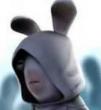 COLLECTOR COLLECTOR
|
dielinfinite private msg quote post Address this user | |
Monthly (Comic) Book Club - June - Astro City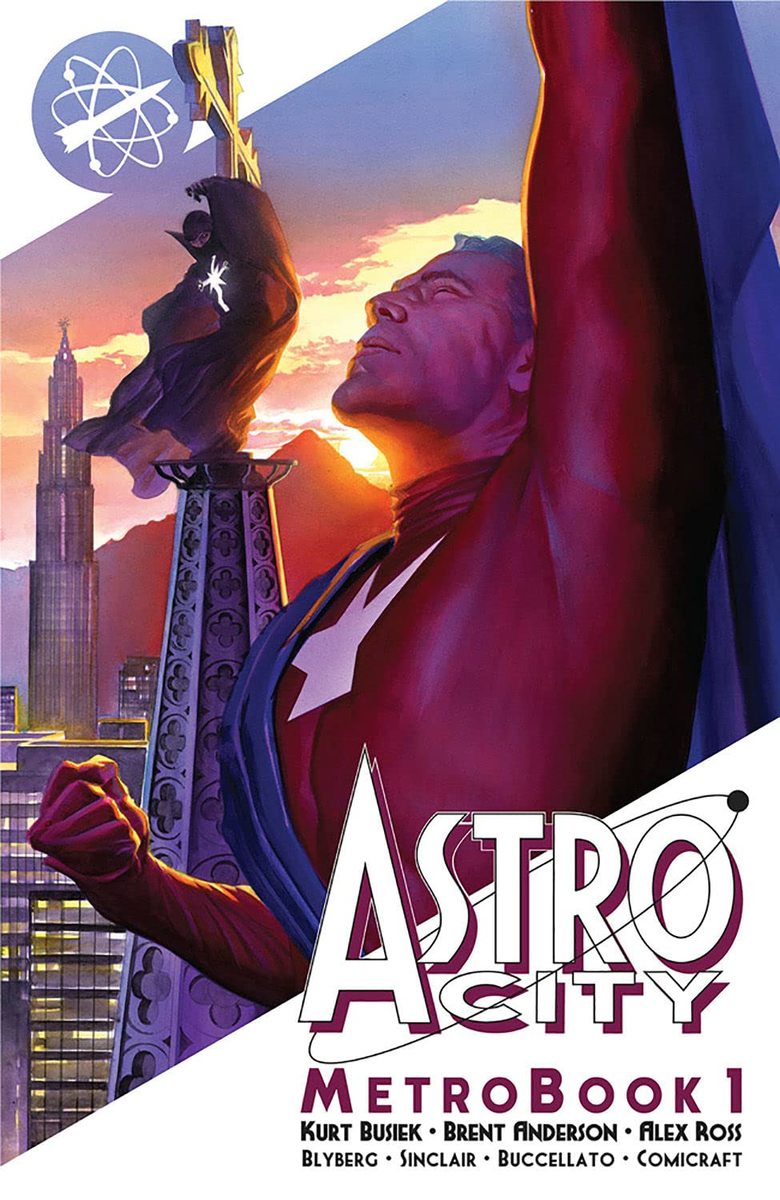 Astro City: Vol. 1 #1-6 Astro City: Vol. 2 #1-12, 1/2 Week 1 (5/30-6/5): Vol. 1 #1-3 Week 2 (6/6-6/12): Vol. 1 #4-6 Week 3 (6/13/-6/19): Vol. 2 #1-4 Week 4 (6/20-6/26): Vol. 2 #5-8 Week 5 (6/27-7/3): Vol. 2 #9-12, 1/2 Discussion topic ideas: * Thoughts on the story or artwork * Details in the story, artwork, or presentation * References to outside events or other works of fiction * Making of/Behind the Scenes details * Editions you will be reading from * Items in your collection pertaining to this week’s selection |
||
| Post 1 • IP flag post | ||
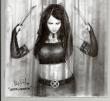 If the viagra is working you should be well over a 9.8. If the viagra is working you should be well over a 9.8.
|
xkonk private msg quote post Address this user | |
| We've read Busiek already in the Marvels series. I haven't seen a lot of Brent Anderson's work but he did God Loves, Man Kills, which is one of the quintessential X-Men stories. Given the general recommendations for the series, I'm optimistic about this month's reading. | ||
| Post 2 • IP flag post | ||
 If the viagra is working you should be well over a 9.8. If the viagra is working you should be well over a 9.8.
|
xkonk private msg quote post Address this user | |
| #1 is essentially a day in the life of Samaritan, a Superman analogue. He looks kind of like Superman, with the haircut and square jaw, and he works at a newspaper. This isn't quite a Superman story though, as Samaritan is constantly helping others with no time for a Lois Lane in his life. I think it's an effective, moving story. It isn't clear why a superhero would dream of flying but it gets there by the end of the issue. Samaritan enjoys flying but gets to do so little of it as he speeds from crisis to crisis. He's removed, or won't allow himself to indulge, in many (any?) personal pleasures because every moment he's doing something, someone is dying somewhere else. But the story comes across as more wistful than resentful to me. Samaritan seems dedicated to his cause even if he misses out on things he could have for himself. It seems like a strong commitment to "with great power comes great responsibility". A couple of minor quibbles. The most minor is that, given Samaritan's lifestyle, I'm not sure why he works at a newspaper or has a secret identity. That could be clarified down the road. The second most minor is why bother drawing nude people if you can't show nude people? There are effective ways to do it, of course, and I understand that it emphasizes the freedom he feels in dreams. But the swoosh cover-up doesn't work for me and Samaritan mostly looks like a Ken doll. |
||
| Post 3 • IP flag post | ||
 COLLECTOR COLLECTOR
|
dielinfinite private msg quote post Address this user | |
| So I think I’ll start of with some preconceptions here. I was aware of Astro City when it was originally released however I wasn’t even ten years old at the time and metaphorical and archetypical commentary wasn’t really part of my understanding. As such Astro City looked to me like some kind of knockoff Superman book. After the first issue I think I can say I was both right and wrong. The Samaritan is very much a Superman analogue but done with the purpose to comment on and explore the idea of superhero comic books and not due to limited creativity. My second preconception was die to the book always being advertised alongside Alex Ross’ art, I had thought that Astro City was fully painted in the vein of Marvels or Kingdom Come. Brent Anderson’s art certainly looks good but but it’s entirely different from what a Ross illustrated book would be. My feel from issue 1 is that it is similar to say Watchmen or Identity Crisis in that it is looking at the superhero comic genre through a grounded more, realistic lens but unlike those other two does so without the weight of overwhelming cynicism. In Superman you often have that image of Superman, so dedicated to helping people that he flies up into space just listening and waiting for trouble to go and help. Here we have a never-ending parade of problems from super villains and bank robberies to natural disasters and stuck kittens. The book doesn’t present this as result of a decrepit and declining world but just real life. It doesn’t have to be a post apocalyptic world to have have so many problems that not even Superman has enough hours in the day to address them all but it is, for the most part, also the world we all navigate through every day. I have to wonder if some part of this issue was inspired by Alan Moore’s Miracleman, whose first arc was titled A Dream of Flying and also dealt with a realistic take on superheroes though, again, with a more cynical outlook. The book introduces this world’s Justice League analogue, the Honor Guard. We get more super hero archetypes (mostly judging from the names since we don’t see them in much action) like a Wonder-Woman-type, a speedy Flash-type, a magical Zatanna-type, an energy-projecting Green Lantern-type, and a couple more that I couldn’t quite place. Quote: Originally Posted by xkonk All we really get is a brief line saying that he needs their computer network connections. I kind of just figured, aside from supporting the Superman connection, that he uses the position to help stay abreast of the goings on in the world to help his alter-ego be more effective. He does have that alarm of his but it seemed like maybe it needed to connect to the internet at some point to work best? |
||
| Post 4 • IP flag post | ||
 Masculinity takes a holiday. Masculinity takes a holiday.
|
EbayMafia private msg quote post Address this user | |
Quote:Originally Posted by dielinfinite I think you are right that Astro City is initially intended to be more light-hearted and whimsical than the other "reality" comics. Not so much "what if super-heroes were real" as "what if there was a place where these absurd characters actually had these absurd adventures". |
||
| Post 5 • IP flag post | ||
 If the viagra is working you should be well over a 9.8. If the viagra is working you should be well over a 9.8.
|
xkonk private msg quote post Address this user | |
Quote:Originally Posted by dielinfinite I think it mostly serves to emphasize the Superman analogy as well as how little of a personal/non-hero life he has. He can't hang out with his coworkers because he has to go save people, and he barely even works while letting the computer do most of it for him. If he needed internet (or whatever, the internet barely existed in '95) I'm sure the people with the space station would figure it out for him. Income for his apartment seems like a likely culprit. But it's really aside from the point of the story. Like I said, minor quibble. |
||
| Post 6 • IP flag post | ||
 If the viagra is working you should be well over a 9.8. If the viagra is working you should be well over a 9.8.
|
xkonk private msg quote post Address this user | |
| #2 is reminiscent of Marvels as an old reporter's story. Maybe it sets up Samaritan's job at the newspaper in #1 as kind of a frame or link across the stories. Sort of interesting, the old superhero mentioned early in Eliot's story, Lamplighter, is also a superhero in The Boys. Just a shared name of course. Google tells me there was an old Green Lantern character named Lamplighter as well. The old-timey-ness extends to the art of the story. The big cigarette ad, which you don't see much if at all any more, has either a superhero or someone dressed like a superhero. That was a nice touch. Also, the panel where Silver Agent leaps to the altar has a very Kirby-esque feel to me. If the first issue was a meditation on being a superhero, this is a meditation on being a reporter in a superhero world. As Eliot says toward the end, it's a crazy world and people will see a ton of crazy things. A responsible journalist's job is to report what they can verify even if it isn't the whole story. It strikes me as one of those lessons that seems old-fashioned or hackneyed but is obviously evergreen. |
||
| Post 7 • IP flag post | ||
 COLLECTOR COLLECTOR
|
dielinfinite private msg quote post Address this user | |
Quote:Originally Posted by EbayMafia From reading Marvels I don’t doubt that we’ll see conflict and things won’t always be bright and cheery but I do hope the series manages to maintain an overall more positive outlook. |
||
| Post 8 • IP flag post | ||
 If the viagra is working you should be well over a 9.8. If the viagra is working you should be well over a 9.8.
|
xkonk private msg quote post Address this user | |
| #3 gives us a third perspective on living in Astro City. After a superhero and a reporter we get a criminal. Not a supervillain though; a run-of-the-mill henchman (henchman might even be generous?). I liked this one. The whole issue reminded me of the Batman quote about criminals being a cowardly lot. Also, Eyes shares a certain misguided sense of his abilities. We're introduced to him messing up a heist by not keeping proper lookout but he spends most of the issue telling us how you can get ahead if you keep your eyes open. On the whole it's a good encapsulation of the bumbling crook idea. This was also an interesting contrast right after reading Identity Crisis. In Crisis, bad guys discovering good guys' secret identities is such a concern that they turn to mind wiping and then psychic manipulation. Here, the bad guy has such fear and mistrust of both the good guys *and* the other bad guys that he just keeps it to himself and leaves town. Of course, we don't know what the Deacon or some other supervillain would have done if they knew Jack in the Box's identity, but the story fits better with generally more positive outlook that we've mentioned with the previous issues. |
||
| Post 9 • IP flag post | ||
 COLLECTOR COLLECTOR
|
dielinfinite private msg quote post Address this user | |
| I very much agree that issue #2 feels like something out of Marvels. It’s set in what would be the Golden Age. The story told feels very much like a Golden Age story with cults, and wacky heroes like the bouncing Beatnik. The story retains that bit of nostalgic idealism. The skies are bright and the future is filled with possibility. I do like that the story is mostly unrelated to the first. At this point it almost feels like the series, at least this first run, will be an anthology. The book is called Astro City not The Samaritan or The Honor Guard. As such, it feels that the city is the main character. It reminds me a little about the episode of the Simpsons, “22 Short Films About Springfield,” which weaved multiple stories following different characters, some major, some minor, but all defining and defined by the city. Of course I’m only two issues in so the whole thing could easily change in the remaining four issues |
||
| Post 10 • IP flag post | ||
 If the viagra is working you should be well over a 9.8. If the viagra is working you should be well over a 9.8.
|
xkonk private msg quote post Address this user | |
| #4 expands the Astro City borders to a new neighborhood (maybe a suburb?) called Shadow Hill. It seems like the magical/supernatural part of the area, and maybe Marta is going to be like a Dr. Strange equivalent, but instead the story is a meditation on how different places aren't so different. The gleaming city and their superheroes, especially Winged Victory, has a draw for Marta. But she realizes after a supervillain attack at her workplace that any area has its ups and downs, and the difference is really just what you're used to. In the end, Marta chooses her sigils and crucifix over a superhero communicator badge. It's another well-told story. I enjoyed that there's kind of a meta-level, like how superheroes and supernatural stories are near each other and aren't that different even if fans of one might look at the other a little side-eyed. I also like the real-world part, a sort of "the grass isn't always greener" bit on how different places and people aren't really that different. It's more about the trappings or details than the fundamentals. It fits in with the more optimistic or folksy angle of the series, as compared to the more cynical bent that people have mentioned when thinking of Watchmen or Identity Crisis. |
||
| Post 11 • IP flag post | ||
 COLLECTOR COLLECTOR
|
dielinfinite private msg quote post Address this user | |
Btw, the Old Soldier reminded me a ton of Captain America from Earth X. Written by Alex Ross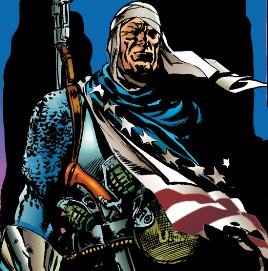 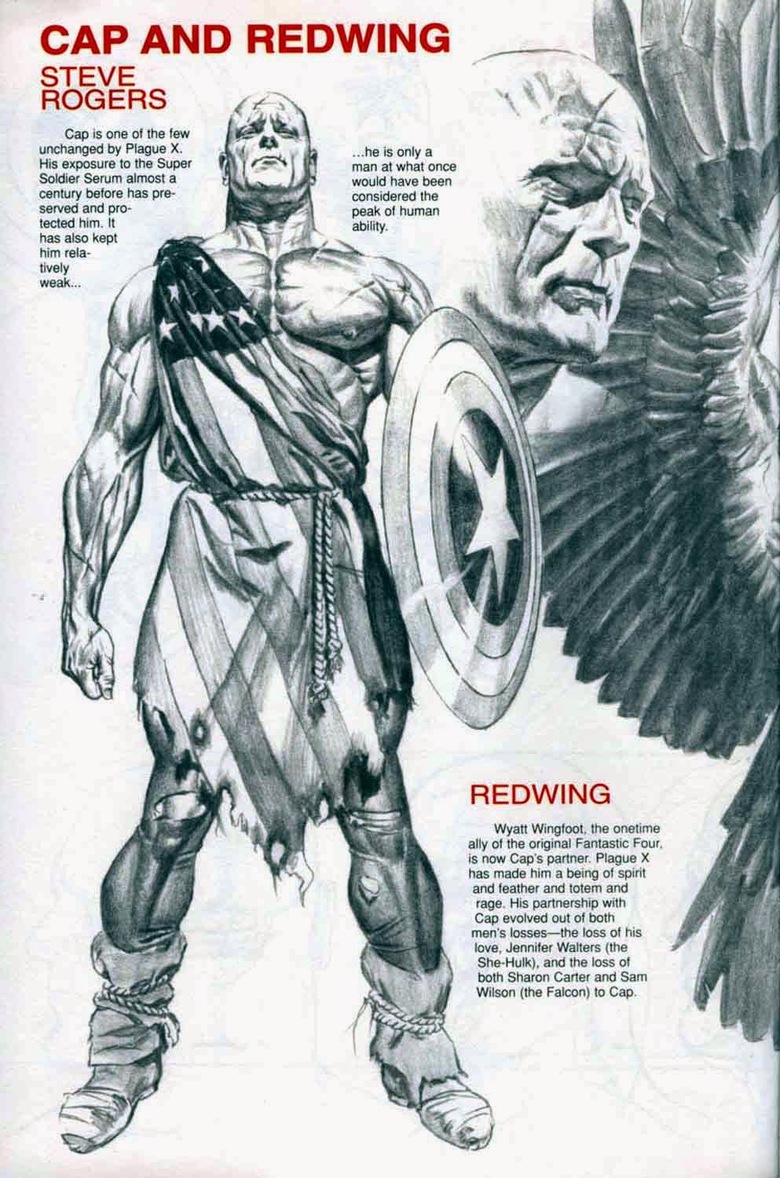 |
||
| Post 12 • IP flag post | ||
 If the viagra is working you should be well over a 9.8. If the viagra is working you should be well over a 9.8.
|
xkonk private msg quote post Address this user | |
| Old Soldier certainly strikes as a Captain America analogue. The armor you can see on his arm is Captain-esque. Interestingly, Astro City predates both Earth X (literally wearing the flag) and Bucky's coming back as the Winter Soldier (they mention how Old Soldier was seen across so many years but with large gaps where he went missing). | ||
| Post 13 • IP flag post | ||
 COLLECTOR COLLECTOR
|
dielinfinite private msg quote post Address this user | |
| @xkonk oh, definitely a Captain America analogue. Even the gaps in activity I took as a reference to cap in that the character was active in WWII, frozen, then re-emerged in the 60s Pretty much every modern patriotic hero cribs from Cap in some way. Some more than others… 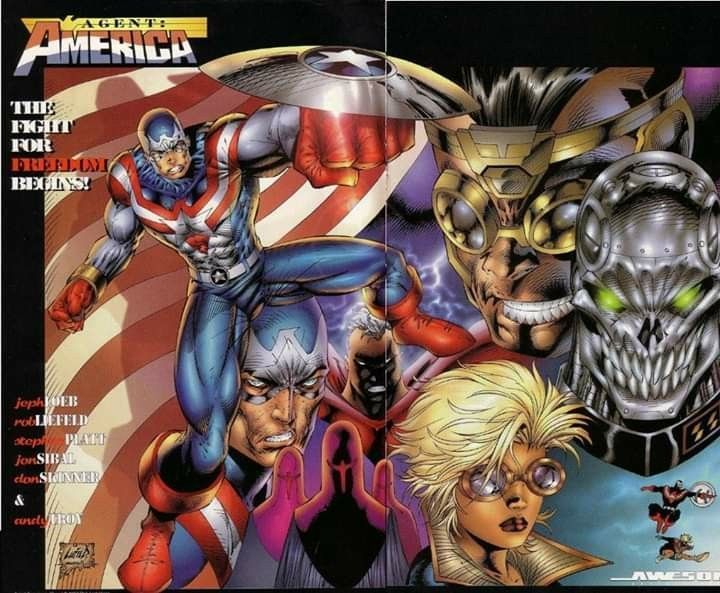 |
||
| Post 14 • IP flag post | ||
 Moderators handing out titles: Boom. Roasted. Moderators handing out titles: Boom. Roasted.
|
Hcanes private msg quote post Address this user | |
Quote:Originally Posted by dielinfinite Rob Liefeld got a cease and desist from Marvel due to this. Imagine if DC had done that with Deadpool, although Agent America was a little to 1:1. |
||
| Post 15 • IP flag post | ||
 COLLECTOR COLLECTOR
|
dielinfinite private msg quote post Address this user | |
| Agent America, later Fighting American when he got permission to revive the character, is definitely more than a cheeky homage the way Deadpool was to Deathstroke. One rumor going around was that his Fighting American character emerged after Liefeld had finished pages from his work on Captain America that Marvel didn’t publish so this was a way to use those pages. Not sure how true that is but there are so many elements that just scream Captain America from the round shield (I believe due to the legal ruling Liefeld’s character was not allowed to throw it), is that a metal skull instead of a Red Dkull, to the supporting cast, the plucky young girl sidekick on the bottom right looks like a copy of Rikki Barnes, which Liefeld co-created for Marvel 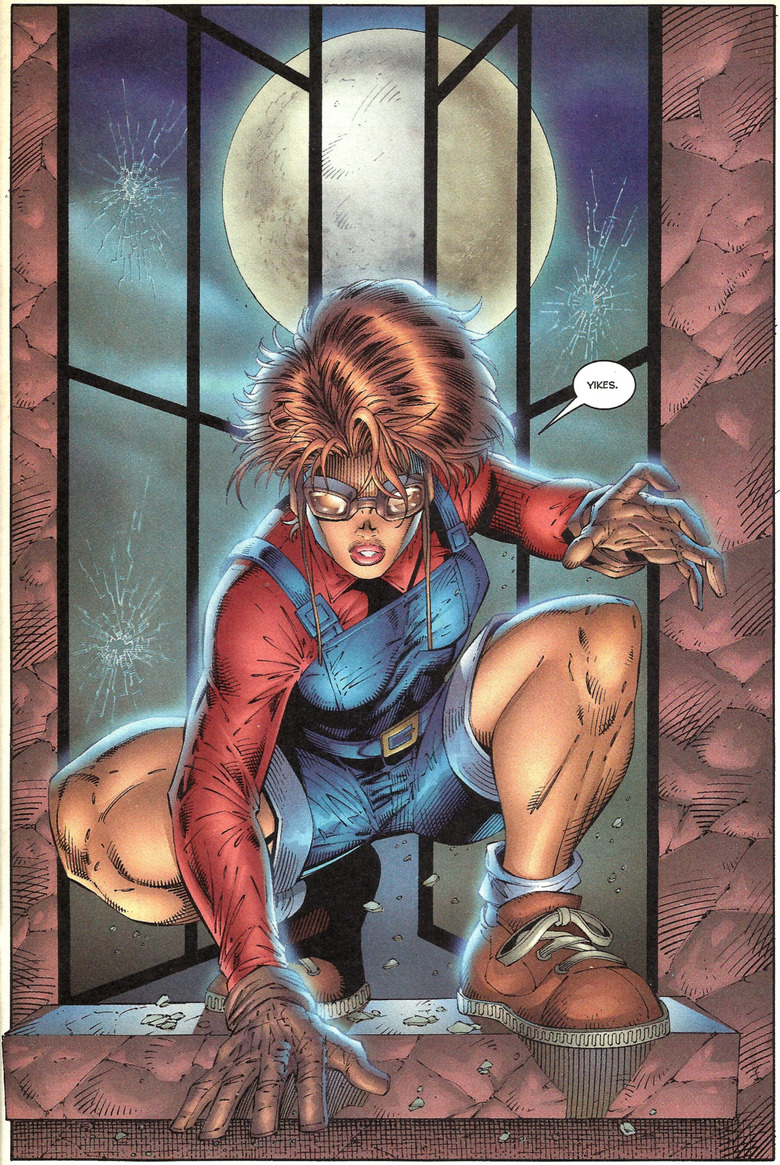 |
||
| Post 16 • IP flag post | ||
 If the viagra is working you should be well over a 9.8. If the viagra is working you should be well over a 9.8.
|
xkonk private msg quote post Address this user | |
| #5 is the first issue that I would say aims to be funny. It's a standard sci-fi story, the alien watching Earth to decide if it should be invaded (and/or the alien deciding if humanity deserves to live), but here Earth is judged by one more-or-less random hero. Crackerjack is a good target for humor, having the confidence of Tony Stark with little of the talent, and would probably be a run-of-the-mill C level villain if he weren't trying to do good. The end, where Bridwell decides "humanity is flawed but deserves to keep striving, is pretty standard so I enjoyed the twist where Bridwell sends the message to invade because of the old biddies in his apartment building. I think this is a good example of the value of an anthology series. It's hard to imagine where an issue like this would fit into an ongoing book since there's little focus on a hero aside from a guy who comes across in kind of a bad light. But it was certainly a good read. |
||
| Post 17 • IP flag post | ||
 COLLECTOR COLLECTOR
|
dielinfinite private msg quote post Address this user | |
| I also really liked issue 3. I thought Jack in the Box was an interesting character, premise-wise. It seems almost like a what if Batman was the Joker but still a hero. The alter-ego remains a wealthy man, though certainly more modest than Bruce Wayne. It is hard to see a clown-based character and not think Joker. This issue made me think a little of like an Outer Limits episode or something where the criminal’s own imagination is the true source of his despair. His paranoia is twisting everything he sees and happens around him to fuel his fear. The issue never confirms that Jack in the Box knows someone saw him or that he even recognizes Eyes. Eyes just happens to be in the wrong place at the wrong time. The contrast with Identity Crisis is interesting. I think the specific people who learn the identities make a huge difference. Eyes is incredibly afraid, as much of the bigger criminals as he is of the heroes. It definitely seems like someone like the Deacon knowing the identity would be an entirely different situation. I continue to enjoy the anthology style of the series. It’s nice to have a complete story in each issue. Sure the scale of the stories are smaller but it also seems like going big and bigger just makes it easier to stumble. Zero Hour was just all over the place because it tried to cover too much but Identity Crisis pared things down significantly and was more focused in its storytelling and worked much better. FYI, Issue #1 won the Harvey award for best single issue/story while issue #4 won the Eisner award in the same category |
||
| Post 18 • IP flag post | ||
 If the viagra is working you should be well over a 9.8. If the viagra is working you should be well over a 9.8.
|
xkonk private msg quote post Address this user | |
Quote:Originally Posted by dielinfinite That's a good comparison. |
||
| Post 19 • IP flag post | ||
 If the viagra is working you should be well over a 9.8. If the viagra is working you should be well over a 9.8.
|
xkonk private msg quote post Address this user | |
| #6 brings us back around to Samaritan. It's the first issue in the series that I haven't enjoyed on the first pass. The other heroes of Astro City get together to make sure Samaritan and Winged Victory can have a night off and organize a date for them. It provides an opportunity to discuss some why's of superhero-ing (which is odd, because Samaritan says the idea is to get away from shop talk). The issue does address some questions I had from #1. Samaritan's backstory addresses the bit about working at a newspaper, and the fact that they can sit in a restaurant (even if they only do it once every couple years) provides a reason to keep a secret identity you barely use. I do like Samaritan's backstory as a twist on Superman's. I think part of what I didn't like about the issue is that, in places, Samaritan seems more like a narrative device than a person. Like him thinking that Victory's powers were literally tied to favoring women so that she can spell out her philosophy, it strikes me as purposefully clueless. Samaritan also questioning Victory spending all her time on the costume and the mission seems odd given his lifestyle. Victory at least runs/sponsors her schools, while Samaritan has no apparent tie to society aside from his superhero-ing. It could also be that the story is being intentionally antagonistic. Victory is bumped repeatedly during their meal and questioned about her choices by a somewhat clueless, hypocritical guy until she boils over. I'm not sure if the reader is supposed to adopt Victory's frustration, but I did. I'm sure others heard her thing about saving a woman over a man, all else equal, and did think of her as an anti-American lesbian terrorist. Having typed it out, perhaps this story is something of a companion to #4. Samaritan and Winged Victory have different approaches and reasons for being heroes, but they aren't really that different. I guess they realize that as well given how the story ends. |
||
| Post 20 • IP flag post | ||
 COLLECTOR COLLECTOR
|
dielinfinite private msg quote post Address this user | |
| Issue 4 was really interesting and it really made me think that despite all the trappings of mundane reality, the book feels almost like a fairy tale at times. The idea that the city has area where shadow-dwelling horrors are an everyday thing and yet life goes on within and it exists among the rest of the city reminded me of Disneyland with it’s interconnected themed worlds. Downtown is basically Superman’s Metropolis, Chelser is Batman’s Gotham, and Shadows Hill is where all the 70s horror comics take place. I find it interesting that despite the ubiquity of superheroes in this world that the heroes are mostly incidental to the stories being told. Aside from the first issue which gave us a day in the life of this world’s Superman, the stories so far have been following every day people. They days and their lives are impacted by the heroes and villains, yes, but the stories are not a grand melodrama about a superhero foiling his arch-nemesis’ elaborate master plan. This is very similar to Marvels where we would catch glimpses of known comic book events but they were often out of context simply because the every day people we follow are not privy to them. The issue pays tribute to Jack Kirby by naming a mountain after him and we also get a team named the First Family. I don’t think they were limited to four but it seems a reference to the Fantastic Four, aka Marvel’s First Family. |
||
| Post 21 • IP flag post | ||
 If the viagra is working you should be well over a 9.8. If the viagra is working you should be well over a 9.8.
|
xkonk private msg quote post Address this user | |
| Volume 2 #1. While #2 in the first series had a bit of a Marvels feel, coming from the perspective of a reporter, I think this issue had the most Marvels feel for me so far. It's largely from the perspective of the Pullam's, a family that just moved from Boston. It's their first day in Astro City but it's saturated with superheroes, from Samaritan capturing people right in front of their new apartment to an attack by some kind of weather god. There are references to older heroes, including something about Silver Agent that seems dicey, and we see a bunch of current heroes between the Thunderhead battle and bad guys trying to take advantage. In the meantime, the Pullam's (and everybody else) soak it in while also preparing for the next day as if nothing is happening. It reminded me a lot of Phil Sheldon's early time, viewing the battles between the Human Torch and Namor like weather and acts of god. | ||
| Post 22 • IP flag post | ||
 COLLECTOR COLLECTOR
|
dielinfinite private msg quote post Address this user | |
| I agree issue 5 was a fun short. It left me wanting to see more of Crackerjack, who I thought was admirable for having just lost his home (and his records!) and still going out to fight crime with a sense of humor. It does leave me wondering about what will happen to Blackjack now that his identity is public and obviously what will come of the alien invasion. Perhaps one or both of these elements may be touched on in subsequent issues. |
||
| Post 23 • IP flag post | ||
 COLLECTOR COLLECTOR
|
dielinfinite private msg quote post Address this user | |
| I did enjoy issue 6, maybe a little less so than the others, which more tightly scripted short stories. I think the main crux of the story was meant to show that these kinds of characters can’t simultaneously live a normal life alongside their superhero personas. Some of these characters simply want to do good and others are driven by ideology but to do so to the extent we expect to see from a superhero detaches you from that normal life. Even when they take a night off neither one has much to say beyond the subject of their superhero-ing and both are still basically listening to police chatter about events going on as they are dating. I think Samaritan’s cluelessness is a symptom of his detachment. Yes he has a civilian identity but he makes so little use of it that he has trouble simply conversing with someone as a person. For Winged Victory she’s basically left her human life behind to get away from the judgement and criticism of her mission. Here’s she’s kind of confronted with it and she has to vent. I also really like that the book is able to close on a mostly happy note despite what the central characters are burdened with. Both do hope things will be different and part of what they need to understand to get there is that they don’t have to be “on” every moment of every day. They took the night off and the world didn’t fall apart so maybe they can have that comic book superhero life. |
||
| Post 24 • IP flag post | ||
 Masculinity takes a holiday. Masculinity takes a holiday.
|
EbayMafia private msg quote post Address this user | |
If you guys are reading Astro City for the first time and enjoying it, I hope you will go on to read "Confession". It's a darker but deeper level of Astro City. My favorite of the series, a play on Batman and Robin. I've read it a couple times.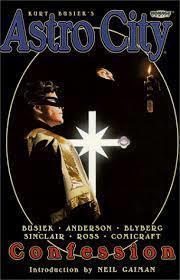 |
||
| Post 25 • IP flag post | ||
 COLLECTOR COLLECTOR
|
dielinfinite private msg quote post Address this user | |
| It looks like Confession is issues 4-9 of volume 2 which we will be reading Quote: Originally Posted by dielinfinite |
||
| Post 26 • IP flag post | ||
 If the viagra is working you should be well over a 9.8. If the viagra is working you should be well over a 9.8.
|
xkonk private msg quote post Address this user | |
| #2 takes into the perspective of the First Family, but through the eyes of the youngest member, Astra. They're very obviously a Fantastic Four analogue, but there are some differences like multiple marriages and a second generation. The series has been fairly light on superhero battles, and this one is pretty perfunctory, but I enjoyed it. Maybe because it was quick and breezy, or Silver Brain is such a retro villain, I'm not sure. The focus is more on Astra being both a kid and a hero. She has the same hero problems that we saw with Samaritan and Winged Victory, in that she has little knowledge of 'normal' life, and a touch of the Marta story on interest in the other side. Astra is caught in that in between place where she's obviously competent in what she's doing but it still treated like a child. I've never been a Fantastic Four reader but maybe we should add on of the more recent trades to the list, where Valeria and Franklin are part of the team. If it's like this maybe I would enjoy it more than I've thought I would. Also, this is the first Astro City book to end with 'to be continued'. Going along with @EbayMafia's comment, maybe we're heading to more serialized stories instead of the anthology style so far. |
||
| Post 27 • IP flag post | ||
 If the viagra is working you should be well over a 9.8. If the viagra is working you should be well over a 9.8.
|
xkonk private msg quote post Address this user | |
| #3 is indeed the second part to number 2. It follows Astra as she goes on an 'adventure' to a normal school to learn about hopscotch as well as the rest of the First Family as they try to figure out which of their many enemies has kidnapped her. I didn't like this issue as much as the other ones. Not because it was a bad story or anything, but because it didn't seem to fit in with the series' theme. Particularly the First Family section, I don't think it served the story much beyond really emphasizing how much they wanted their daughter back. I think the value was in Astra's side of the story, showing how she tries to fit in with regular kids and learn about the 'normal' world. As far as the theme goes, I think you could draw a distinction between how Astra handles her problems and how the Family does. When she gets frustrated she stops herself from using her powers; she's trying to get good at the game 'the right way'. The Family, on the other hand, runs around getting into fights and raising a fuss everywhere they go. That said, the point was made with fewer of the Family scenes. It also seems like there's a general point that Astra is as capable as, and maybe more responsible than, her parents. Something along the lines of the next generation learning from the mistakes of the previous one. But I think it could have come across more strongly or clearly with a bit more focus in the storytelling. If the next story is a 4-5 issue arc, we'll see if some of that same problem sticks around. Hopefully it is at least more compelling than some standard superhero fights. |
||
| Post 28 • IP flag post | ||
 If the viagra is working you should be well over a 9.8. If the viagra is working you should be well over a 9.8.
|
xkonk private msg quote post Address this user | |
| #4 sets up the next arc. Again, there are some thematic things you could look for that fit in with the rest of the series, but this issue seems much more serial. This one is from the perspective of a new kid in Astro City, one who left his small town for a chance in the big city. I don't think we even get his name aside from one spot where he refers to himself as 'the Kinney kid'. But he's obviously in town to learn how to be a superhero. His father was a doctor who sacrificed his own family's potential to serve his community. While he seems to have adopted the service idea, he says he's "going to be somebody", so we'll see where that goes. A chance attack at a hero club looks like it's going to be his opportunity to get in. While not as meta-focused as the other issues in the series, I did enjoy the atmosphere of this story a bit more than the previous two. I'll keep my hopes up given @EbayMafia's referral. |
||
| Post 29 • IP flag post | ||
 If the viagra is working you should be well over a 9.8. If the viagra is working you should be well over a 9.8.
|
xkonk private msg quote post Address this user | |
| #5 is a check-in on Kinney's development as a superhero. He's become an 'apprentice' to the Confessor, sort of a Batman type but with a religious theme. While Altar Boy is learning the ropes and making progress, the issue sets up the central mystery of who the Confessor is exactly. Kinney's low confidence in his ability to figure it out is a little odd to me. He's confident (maybe overconfident?) in the other things he does. He's also seen Confessor's face but doesn't think he would recognize him in 'real life'. Wearing a disguise is an obvious option but it struck me as odd. Also a little odd is the alien from the first series coming back as a Crackerjack imposter. The alien was upset about the situation, but committing crimes to smear Crackerjack seems a little lowbrow for him. Maybe something else happened in the meantime that really got his goat. |
||
| Post 30 • IP flag post | ||
This topic is archived. Start new topic?
